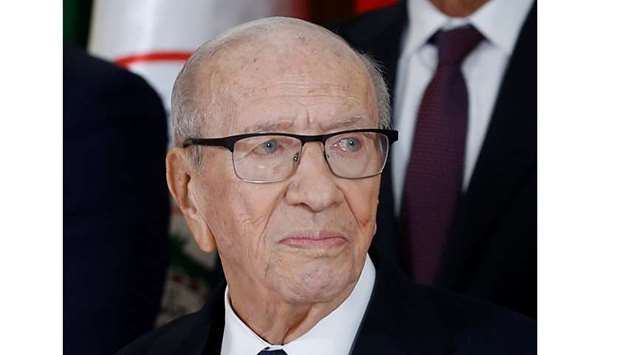Tunisian President Beji Caid Essebsi stressed the need to promote Arab joint action, and achieve Arab reconciliation based on mutual trust, stressing that Arab countries have no choice but to co-operate and enhance confidence and co-operation between them.
The president said in a speech during the opening session of the 30th Summit of the Council of the Arab League yesterday in Tunis that the liberation of the Arab region from all crises, tension and threats is a pressing need and not be delayed.
He reiterated Tunisia’s firm determination that this summit should be a new step in promoting Arab solidarity and activating joint Arab action in all its dimensions.
He said that “we must work to overcome differences, clean up the Arab atmosphere and strengthen the bonds of solidarity between us, stressing that the challenges and threats facing the Arab region are too large to be addressed individually.”
The Tunisian president called to “take a careful and firm stand to identify the causes of weakness and imbalances in our joint Arab work, so that we can unite our vision and develop a collective assessment of risks and challenges and rearrange priorities on the basis of the most important before the important.”
He confirmed that the Arab dimension represents the most important fundamentals in Tunisia’s foreign policy.
President Essebsi stressed the centrality of the Palestinian cause, stressing that achieving this goal requires intensifying and co-ordinating actions in order to put an end to the decisions and practices aimed to change the basic issues of the Palestinian cause, and to face any violation of the legitimate rights of the Palestinian people, especially their right to self-determination, and the historical and legal status of the Holy City of Jerusalem.
He added that the achievement of security and stability in the Arab region and the world as a whole passes through a just and comprehensive settlement of the Palestinian issue that guarantees the rights of the Palestinian people, and lead to the establishment of an independent Palestinian state with Jerusalem as its capital, based on the resolutions of international legitimacy, the Arab peace initiative and the principle of a two-state solution.
He said that the situation in Libya remains a matter of deep concern for Tunisia, considering that the repercussions of the crisis situation in this country not only affect neighbouring countries, but security and stability throughout the region.
The Tunisian president renewed his country’s support for the UN efforts and for all regional and international efforts to help end this crisis, away from the conflict of interests and interference in the internal affairs of Libya, stressing his confidence in the ability of the Libyan parties to overcome differences and give priority to the supreme interest of their country in a framework of consensus and constructive dialogue.
On the Syrian crisis, Essebsi called for accelerating the political resolution to the crisis.
On the latest developments aimed at stabilising the occupation of the Syrian Golan, Essebsi reiterated that the international community considers Golan an occupied Arab land.
He called for concerted efforts to end the occupation in order to achieve security and stability at the regional and international levels violating international legitimacy resolutions and increasing the level of tension in the region.
On the situation in Yemen, the Tunisian president reiterated the call for continued regional and international efforts to restore legitimacy in this country and to create conditions for negotiations to reach a political settlement that will resolve the crisis and put an end to the human suffering of the Yemeni people.
He reiterated Tunisia’s welcome to the Stockholm agreement reached by the parties involved in Yemen.
The Tunisian President discussed developments in Iraq and expressed hope that efforts to rebuild liberated areas are successful.
He congratulated the people of Iraq on winning their battle against terrorism.
The Tunisian president also called for activating Arab mechanisms for the prevention, management and settlement of conflicts in order to prevent the prolongation of crises and the obstacles to resolving them.
He also stressed the need to further strengthen Arab relations with other regional gatherings and spaces in the political, economic and cultural fields, in addition to expanding the circle of support for Arab issues in the international arena.
He warned that terrorism remains the biggest threat to the region’s stability, security, and development.
He urged all Arab countries to work together on eliminating the root causes of terrorism by adopting a joint comprehensive strategy in that regard.

Tunisian President Beji Caid Essebsi: u201cWe must work to overcome differencesu201d
